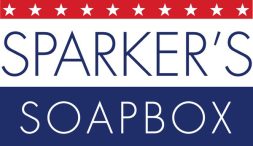
In Collier County, early voting begins August 8 and primary Election Day is August 18. Do you know what’s on your primary election ballot?
I, too, live in Collier County and I’m passionate about helping people be more informed voters. For years, before very election, I research what’s on our ballot and share what I learn in my Sparker’s Soapbox blog. Every election, I publish a series of “Get Ready to Vote” blog posts. This is the first in that series, and you can find them on my website at www.sparkers-soapbox.com/category/voting-and-elections .
In this post, I’ll go over the types of elections we have and who gets to vote in each. Then I’ll turn to the specific offices up for election this year, and explain which will and will not be on the ballot — and why. Next, I’ll list the three referenda that will be on the ballot. And I will close with the next steps you should take to ensure you are informed and ready to vote.
What are the types of races and who gets to vote in each?
Partisan vs. Nonpartisan
In Florida, there are partisan races and nonpartisan races.
Partisan races are those in which the registered members of the Republican and Democrat parties choose their nominees to face off in the general elections in November.
Nonpartisan races are those in which all voters regardless of party affiliation may vote.
Trial court judge and school board elections, which begin with primaries, and elections for the boards of the Soil & Water Conservation, Mosquito Control, Fire, and Community Development districts, which take place in the general election, are nonpartisan; all other races are partisan.
This year, all the races on the primary ballot are partisan races because the incumbents in the judicial and school board positions up for election were unchallenged.
Closed vs. Universal
Florida is a closed primary state, which generally means that only people registered with a political party may vote in that party’s primary.
However, if all the candidates for an office have the same party affiliation and the winner of the primary will not face any opposition in the general election, then all registered voters may vote in that election. It is then referred to as a universal primary.
This year, there are both closed and universal races on the primary ballot.
As I explained in Party Affiliation and Florida as a Closed Primary State, it is very important to understand the implications of your party affiliation on your ability to have input into who will appear on the general election ballot.
At-Large vs. Single-District
In Florida, there are both at-large elections and single-district elections.
In at-large elections, all the voters in the geographic area governed by the elected body elect the members of the body. Local examples are school board members and constitutional officers, which are elected by voters county-wide.
In single-district elections, voters residing in a particular district within the geographic area governed by the body elect a member from that district to represent them. Local examples are the elections of state representatives and county commissioners.
This year, there are both at-large and single-district races on the primary ballot.
Offices & Candidates
The deadline for candidates to qualify to run for office was June 12. The results of the qualifying process fall into several categories:
Uncontested
Twenty-three (yes, 23!) representatives of Collier County constituents will be elected without a vote because only one candidate qualified to run for the office. All are incumbents except as noted. This figure does not include seats up for election on the County’s Community Development Districts, which are outside the scope of Sparker’s Soapbox.
These are the 23 automatically-elected representatives:
- U.S. House District 25 – Mario Diaz-Balart (R)
- County Commission District 3 – Burt Saunders (R)
- Tax Collector – Rob Stoneburner (R) (succeeding Larry Ray, who chose not to run for reelection)
- School Board – Stephanie Lucarelli (District 2) and Erick Carter (District 4)
- Sheriff – Kevin Rambosk (R)
- Supervisor of Elections – Jennifer Edwards (R)
- 20th Circuit Judges – John Carlin, Scott Cupp, Mary C. Evans, Amy Hawthorne, Hugh Hayes, Donald Herbert Mason, and Michael T. McHugh
- County Judges – Robert Crown and Janeice Martin
- Mosquito Control District – Russell Burland (Seat 5, succeeding Michael Reagen, who chose not to run for election)
- Soil & Water Conservation District – Robert M. Griffin ( Group 4)
- Immokalee Fire District – Patricia Anne Goodnight (Seat 2) and Joseph Brister (Seat 4)
- North Collier Fire District – Christopher Lee Crossan (Seat 1), Norman E. Feder (Seat 3) and James A. Calamari (Seat 5)
No Primary Challenger
In one race, just one candidate per party qualified.
- State House District 106 – Bob Rommel (R) vs. Sara McFadden (D)
This race will bypass the primary and go directly to the November ballot.
On the August ballot
U.S. House District 19
- Closed single-district Republican primary with 9 candidates: Darren Aquino, Casey Askar, Byron Donalds, Dane Eagle, William “Fig” Figlesthaler, Randy Henderson, Daniel Kowal, Christy McLaughlin, and Dan Severson
- Closed single-district Democratic primary with two candidates: Cindy Lyn Banyai and David Holden
The winners will face each other and write-in candidate Patrick Post in November.
State House District 80
- Closed single-district Republican primary with three candidates: Drew-Montez Clark, Victor Dotres, and Lauren Uhlich Melo
The winner will face Democrat Laura Novosad in November.
State House District 105
- Closed single-district Republican primary with three candidates: Pedro Barrios, David Borrero, and Bibiana Potestad
- Closed single-district Democratic primary with two candidates: Javier Estevez and Maureen Porras
The winners will face off in November.
County Commission District 1
- Closed single-district Republican primary with three candidates: Mark Batchelor, William Douglass, and Rick LoCastro
The winner will face Democrat John Jenkins in November.
County Commission District 5
- Closed single-district Republican primary with two candidates: incumbent Bill McDaniel and Mike Petscher.
The winner will face Democrat David Turrubiartez Jr. and NOP Raymond Christopher in November.
Clerk of the Circuit Court & Comptroller
- Universal at-large primary with two Republican candidates: incumbent Crystal Kinzel and Jim Molenaar.
The election will be decided in August.
Property Appraiser
- Universal at-large primary with two Republican candidates: incumbent Abe Skinner and Rick Lussy.
The election will be decided in August.
On the Ballot: Referenda
All Collier voters will have a referendum on their ballot put forward by the School Board:
City of Naples voters will have a referendum put forward by the Naples Council:
City of Marco Island voters will have a referendum put forward by the Marco Island City Council:
Next Steps
- Learn which districts you live in so you will know which of the above-discussed races will be on your ballot. (You will be able to view your sample ballot online on or around June 29.)
- Check your voter registration status and confirm your party affiliation.
- If you requested a Vote-By-Mail ballot, confirm that your request has been received.
- If you have not requested a Vote-By-Mail ballot, do it now for the reasons I explained in Request a Vote-By-Mail Ballot Today.
- In the coming weeks, read my posts on the candidates and referenda — and encourage your friends and colleagues to subscribe to Sparker’s Soapbox!
That’s it for now. I look forward to becoming a more informed voter and sharing what I learn. It’s in all of our best interests to participate in an informed way in the election process and to take full advantage of our right to vote.
After all, democracy is not a spectator sport.
